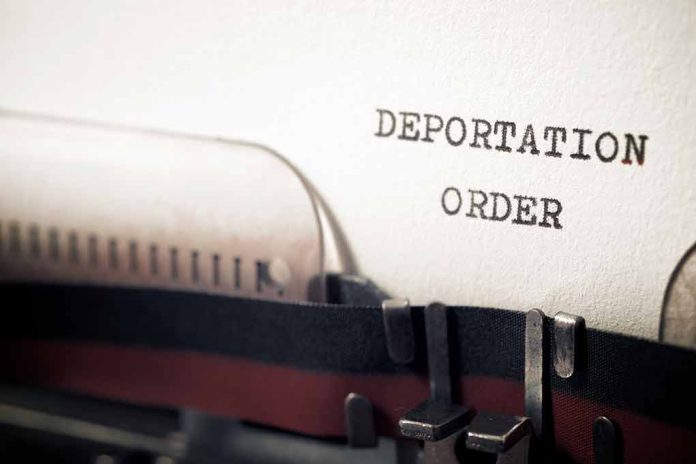
The deportation of Kilmar Armando Abrego Garcia, amid accusations of misconduct against the Trump Administration, reveals complex narratives of national security and individual rights.
Key Takeaways
- Kilmar Armando Abrego Garcia was wrongly deported to El Salvador, resulting in his detention in a maximum-security prison.
- The deportation occurred despite Garcia having no known criminal record and being in the process of appealing a removal order.
- Allegations against him of being involved with MS-13 gang lack substantiation, according to his attorneys.
- The case attracted international attention and raised questions about due process in deportation proceedings.
- The Trump Administration admitted a clerical error caused the wrongful deportation.
Controversial Deportation
Kilmar Armando Abrego Garcia, a Salvadoran national living in Maryland, was deported to El Salvador on April 4, despite a judicial order against such action. He is currently detained in the Terrorism Confinement Center (CECOT) in El Salvador, known for its heightened security. Concerns over Garcia’s deportation arose due to his lack of a criminal record in the U.S. and ongoing appeal against his removal order. This has led to international criticism and scrutiny.
Allegations of Garcia’s involvement with the MS-13 gang surfaced at a White House briefing, prompting further investigation. Despite claims of gang affiliations, his family and attorneys insist on his innocence, asserting that no evidence has been presented to substantiate these allegations. U.S. officials confirmed Garcia’s safety in El Salvador under its domestic authority but have faced backlash for failing to ensure due process prior to his deportation.
Government Accountability
Judge Paula Xinis, who initially blocked Garcia’s deportation, has demanded documentation and depositions from the Trump Administration regarding efforts to facilitate Garcia’s return. Although they claimed to have complied based on their interpretation of “facilitate,” Judge Xinis contended this reading and sought clarification on the administration’s actions. The Supreme Court found the deportation violated prior injunctions protecting Garcia due to gang threats. The federal government’s alleged lack of action to rectify this prompted a lawsuit by Garcia’s legal team.
El Salvador’s President Nayib Bukele refused to consent to Garcia’s return, citing his lack of authority to override the country’s legal proceedings. This geopolitical layer complicates the already intense immigration debate, leading to further calls for transparency and accountability. As the discourse continues, the Trump Administration faces increased pressure to find a resolution.
Govt. allegation that Kilmar Abrego Garcia was in MS-13 appears "to stem from double hearsay in a document authored by a later suspended detective" https://t.co/luqFNPMcEi
— Kathleen Bush-Joseph (@KathleenBushJo2) April 15, 2025
International and Domestic Implications
The continuous legal and diplomatic entanglements surrounding Garcia’s deportation highlight larger themes of immigration policy, national security, and judicial oversight. The Trump Administration’s handling of Garcia’s case—an error labeled as clerical—has become a focal point for immigration rights activists and the international community seeking justice and accountability.
Garcia’s deportation raises questions about immigration enforcement procedures and governmental accountability. It underscores the critical role of investigative journalism in shedding light on potential miscarriages of justice within complex legal frameworks while advocating for individual rights.
Sources:
- Where is Kilmar Abrego Garcia Now? What We Know – Newsweek
- Trump admin won’t be held in contempt over refusal to return wrongly deported alleged MS-13 member Kilmar Abrego Garcia — as judge warns against ‘gamesmanship’
- Trump officials won’t share evidence accusing deported Maryland father of ‘human trafficking’ | The Independent







